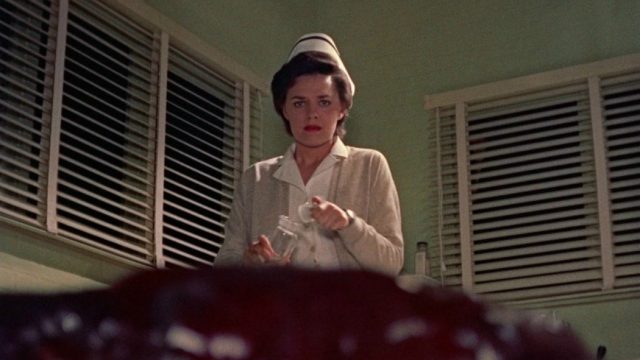This movie has the same qualities as the monster at its centre. Its strength is a relentless forward movement, and its weakness is that it moves so slowly that you can get ahead of it pretty easily. Calling it a flawed masterpiece is way overstating it; it’s more like a movie that could have been great and shows flashes of being good. There’s a lot of traditional crappy scifi B movie problems, like trying to fill out time with long dialogue sections and shots of people simply getting from A to B, and stagy camera work where the camera is basically put on a tripod where that it can see all the characters in the scene, and the underlying dramatic construction manages to elevate some of these problems but not all of them. Those stagy wide angles can actually work when all the characters are arguing because any character can unexpectedly seize control of the shot, and the long conversations work when they act as a different layer of the drama – the opening twenty minutes of the movie are the best part, because there’s a whole arc of boys viciously playing one-up right until the cops get involved while the Blob builds up in the background.
The movie’s attitude towards teenagers is the most interesting idea floating through it. Exploitation movies sit in this weird place between straightforward dramas and postmodern pastiches like Roadracers. They’re largely vehicles for certain kinds of scenes and ideas, but they’re often more matter-of-fact than gleeful about it. This is a movie where the teenage boy has the best idea of what’s going on and a lot more people would be alive if he’d just been listened to, but the closest thing to a dramatic speech or on-the-nose metaphor is when the nice cop remarks that automatically treating the teenagers like criminals is useless. These movies are products designed to generate the most money for the fewest resources, and it’s like the movie believes all it has to do is show teenagers solving problems and anything else is a waste. What that ends up meaning is I wonder how realistic the teenagers of 1958 found this film.
The kids of Attack The Block feel like real teenagers. Even past the sanitisation, the kids of Archie comics feel like inhuman cardboard being slapped together. The kids of soap opera Home And Away are sanitised but at least feel like how teens conceive of themselves and their world. I find myself wondering – did teens look up at the screen and laugh not just at teens who don’t drink or swear, but at the backwards street races and the hero’s weird not-friendship with the cop? Or did they look up at it and say the ’58 equivalent of ‘it me’? Like I said, the best part of the movie is when the boys go from enemies to friends over a shared enemy authority figure, because it feels like that kind of thing happened every day when I was a boy. I was in a position very much like the hero’s when I was a kid, basically seen as a good kid by the adults in my life but not seeing myself as on their side and maintaining friendships with the dodgier kids. Was there some boy in ’58 who saw himself in the hero the same way?
It’s really interesting, too, how this interacts with Steve McQueen’s persona. The great thing about having a specific creative persona is how all your work is in constant conversation in ways you will never intend, and our hero here feels like the teenaged version of a McQueen character. There’s the strengths his future characters would have, an ability to internally calculate while being a lot more aware than you’d assume (him noticing the light before calling the street-race feels like a call forward to planning his first escape attempt in The Great Escape), coupled with a lack of confidence, especially in social situations; there are times where it seems like characters talking to him are interrupting his thought process, and him leading the attack on the Blob at the end is as much a triumphant moment of him finally being allowed to finish a thought as it is the triumph of saving the day.
SCATTERED NOTES
- The weirdest moment in the film is when the mean cop monologues about how the kids are clearly targeting him because they know about his war service.
- Strange how McQueen always looked both middle-aged and boyish.
- The hero clearly stumbles upon a swingers party.

